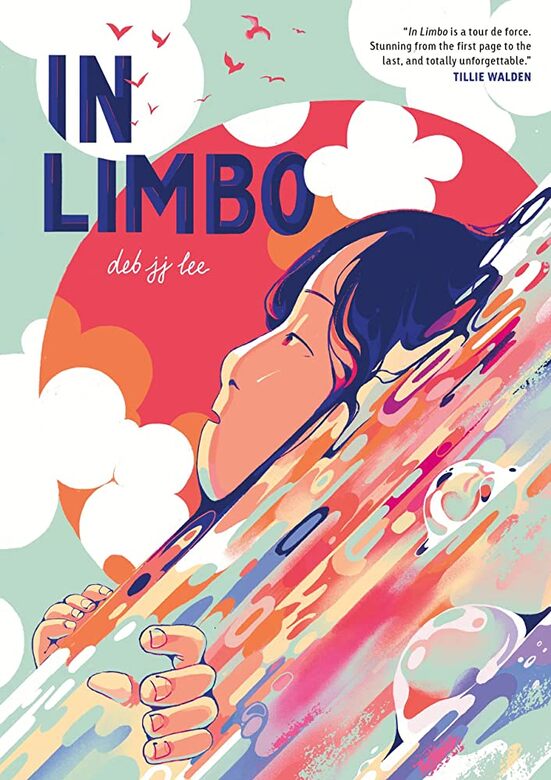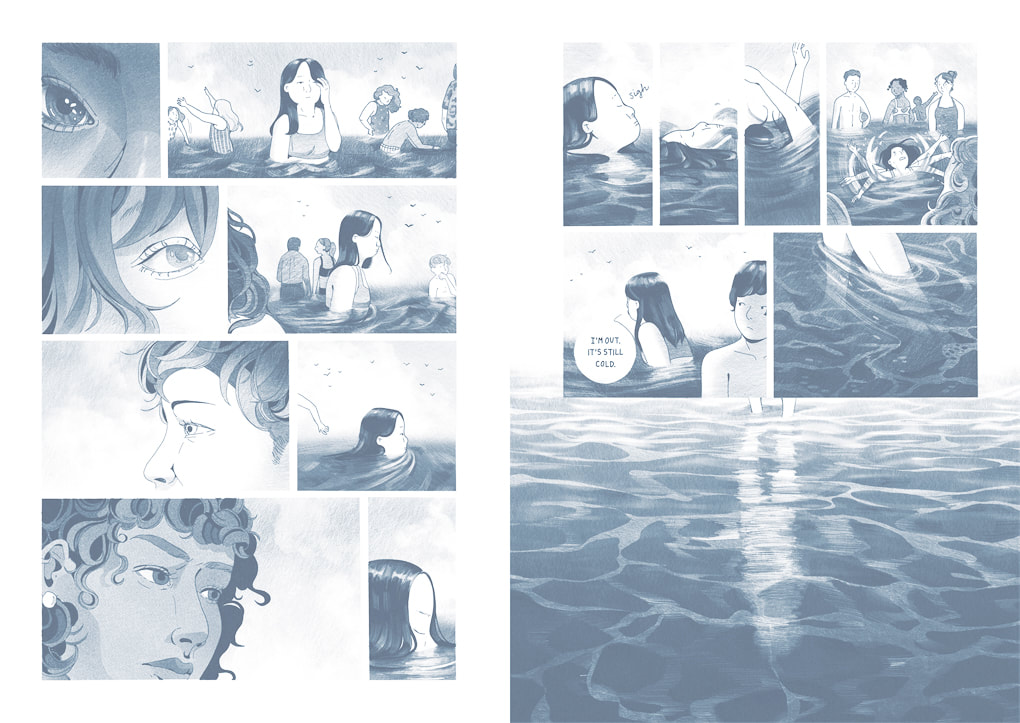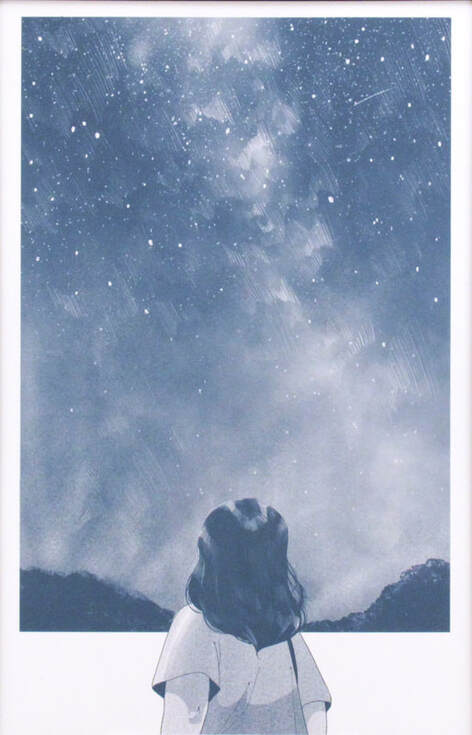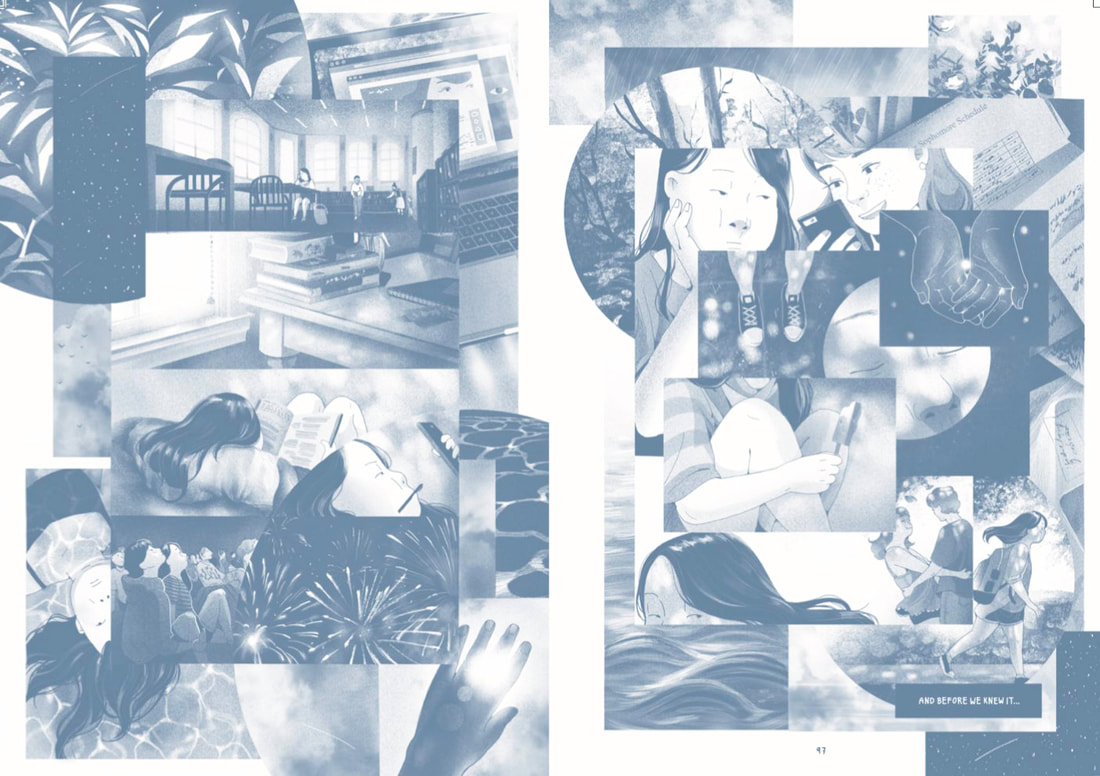|
In Limbo. By Deb JJ Lee. First Second, ISBN 978-1250252661, 2023. US$17.99. 352 pages, softcover. I lost sleep over In Limbo. Foolishly, I started to read it late one night, when I was in a sticky, sort of unhappy mood that had nothing to do with the book and much to do with work. I needed to read something that was utterly different than the work I was obsessing over; I needed a way out of my spiraling. So, I thought I would start In Limbo before bed. Just start it, you know? Get my feet wet. But no — once I started, I had to finish. Damn. There was something quietly harrowing about the book, something that frustrated and gnawed at me. I think maybe I was angry with the book's protagonist, and her mother? Or maybe bothered by the evocations of racism, bullying, or depression? Struck by the contrast between the book's elegant, quiet style and its dark undertow? Whatever it was that got to me, I felt pretty helpless about it. I mean, I did put the book down for a few minutes, about a third of the way in, but then I grabbed it up again, anxiously, and plowed on. As the story got deeper and darker, I was all in. When I finished, it was well after midnight — and of course I had the story on my mind as I tried to get some shuteye. Again, damn. In Limbo is a graceful and refined graphic book, a beautiful feat of design, and a moody, enveloping story. It's also observant and brave. Thematically, the book treads some familiar ground: a high school memoir; a Korean immigrant's story; an exploration of familial tensions, crushed friendships, cultural in-betweenness, mental and emotional fragility, suicidal thoughts. The protagonist is a version of author Deb JJ Lee, and the story tracks her four years of high school, leading up to graduation and college after a long spell of desperation and loneliness. Okay, none of that feels unprecedented. But In Limbo is bothersome and riveting, a tough, involving work. I couldn't read it complacently. It pulled me in with its long silences, layered, emotionally telling details, fraught conversations, and occasional shocks. Its cloudy, blue-grey palette, monochrome yet somehow endlessly varied, feels soft, yet Lee uses it to create sharp, crisply defined pages — despite their refusal of black frame lines and their frequent use of bleeds. (Note that in life the author goes by they, but the book genders Deb as she, which, Lee says, more accurately reflects who they thought they were in high school.) Their layouts are often dense and maximally detailed, yet the overall impression is dreamlike, entranced. At first blush, it looks like a book that should be calm. But calm is not what the book is about, and reading it often hurts. What I'm trying to say is, this is a great and hard book. Briefly, In Limbo follows Deborah (Jung-Jin), or Deb, through her four years of high school as she tries to love and understand herself, embrace art as her vocation, and get out from under her family's expectations, especially the relentless needling of her very driven, at times abusive, mother. Her mom, as a character, hews perilously close to the "tiger mom" stereotype (as the book itself acknowledges). Their relationship is full of jagged edges and cruel scenes — and it's one of the things, I think, that caused me to read on, after midnight, in hopes of relief or understanding. Deb's father and brother don't register as strongly; In Limbo is very much a daughter/mother story. Yet it's also about friendships, sometimes fraught, overburdened ones. Deb's feelings for her friend Quinn, to whom she has a sort of desperate, proprietary attachment, lead to surprising reversals. Officially, In Limbo is described as "a cross section of the Korean-American diaspora and mental health," and that seems right, but it is Lee's depiction of complicated, ambivalent relationships that yields the greatest shocks. Lee doesn't show young Deborah as a good friend; instead, they show her taking friends for granted, or reading them strictly through the lens of her own anxiety, or laying terrible responsibilities on them. In this sense, the book seems self-accusatory. Deb doesn't understand what she's doing, of course, and the story is partly about her coming to grips with how she hurts both her friends and herself. Some relationships outlive the end of the book, others don't, but the book is remarkably generous in the home stretch, as Deb opens out from the tortured inwardness of the first half and learns to see more clearly. To say that the book's characterizations are complex would be a measly understatement. In Limbo doesn't resolve every problem it raises. This is probably partly by design; Lee has acknowledged in interviews (again, see this one) that their life, past and present, is more complex than a single book can cover, and the book seems anxious to show Deborah as a work always in progress. There are things in the book I'd have liked to know more about. Some relationships and threads are still nagging me, even now. Some readers may finish the book wanting to know more about Lee's understanding of internalized racism and the pressure to assimilate. Some may wonder about the connection between those things and the book's tormented mother/daughter dyad (cf. Robin Ha's graphic memoir Almost American Girl). Some readers may be anxious to know more about the mother's abuse, what prompts it, and how Deb lives with it (cf. Lee's own short comic from 2019, "Dear CPS," readable on their website). Some may wish that the Künstlerroman aspect of the book came through more strongly, that they were left knowing more about Deb's artistic vocation. Some may wonder about Deb's implicit queerness or perhaps about gender nonconformity. I've been thinking about all those questions; the book feels a bit tentative about what to include, what to leave out, and how to balance things. That said, I don't expect complete "closure" in memoir, and when I do get it, I worry that I'm being sold a bill of goods. In Limbo has honesty and emotional rawness despite its delicately finished surface, and I dig that. That "surface" is going to draw in and mesmerize a lot of readers, I expect. The book's rapturous reception has a lot to do with Lee's virtuosity as an illustrator and designer (indeed, the many blurbs on the cover note their lush, meticulous art). In Limbo is visually extraordinary; the book is gorgeous and transporting, a master class in narrative drawing and sustained mood. That mood is melancholy almost the whole way through, but In Limbo is vital and ravishing enough to make one fall in love with melancholy. (My images here don't do the book justice.) I'm grateful to this book for introducing me to a singular and gutsy artist. Most highly recommended: another high watermark for autobiographical comics about adolescence. <3
0 Comments
Your comment will be posted after it is approved.
Leave a Reply. |
Archives
June 2024
|





 RSS Feed
RSS Feed
